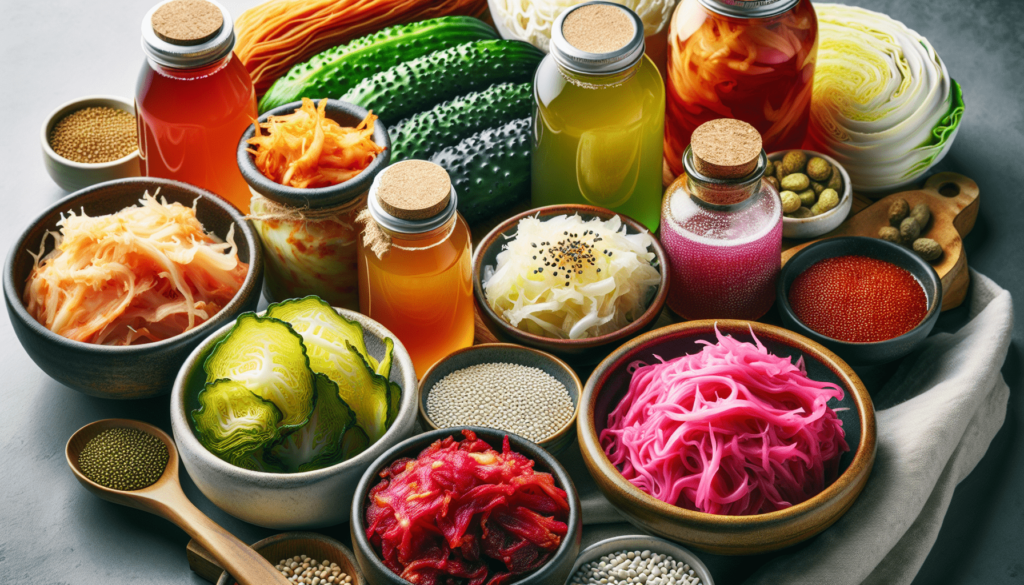Have you ever wondered about the nutritional benefits of fermentation?
When it comes to food, we often focus on the taste, texture, and appearance. However, have you ever considered how the process of fermentation can enhance the nutritional value of the foods we eat? In this article, we will explore the wonderful world of fermentation and discover the many health benefits it offers.

What is fermentation?
Fermentation is a natural process that has been used for centuries to preserve and enhance the flavor of food. It is a metabolic process that converts carbohydrates, such as sugar or starch, into alcohol or organic acids using microorganisms like yeast, bacteria, or mold. This process not only creates unique flavors but also increases the bioavailability of certain nutrients in food.
How does fermentation work?
During fermentation, microorganisms break down the carbohydrates in food, producing beneficial compounds like vitamins, enzymes, and probiotics. These compounds help to improve digestion, support a healthy gut microbiome, and boost the immune system. Fermentation also helps to increase the shelf life of food by creating an acidic environment that inhibits the growth of harmful bacteria.
What are the nutritional benefits of fermentation?
Fermentation enhances the nutritional value of food in several ways. Here are some of the key benefits:
- Increased nutrient bioavailability: Fermentation breaks down compounds in food that may be difficult for the body to digest, making essential nutrients more easily absorbed.
- Probiotics: Fermented foods are rich in probiotics, beneficial bacteria that support gut health and digestion.
- Enzymes: Fermentation creates enzymes that aid in digestion and help the body absorb nutrients more efficiently.
- Vitamins and minerals: The fermentation process can increase the levels of certain vitamins and minerals in food, making them more nutritious.
- Improved flavor and texture: Fermentation can enhance the flavor and texture of food, making it more enjoyable to eat.

What are some common fermented foods?
Fermented foods have been a staple in many cultures around the world for centuries. Here are some common examples of fermented foods:
| Fermented Food | Description |
|---|---|
| Yogurt | Made by fermenting milk with lactic acid bacteria like Lactobacillus |
| Sauerkraut | Fermented cabbage, rich in probiotics |
| Kimchi | Spicy fermented vegetables, a Korean staple |
| Kombucha | Fermented tea with a tangy flavor |
| Miso | Japanese seasoning made from fermented soybeans |
| Tempeh | Fermented soy product, a meat alternative |
| Kefir | Fermented milk drink, similar to yogurt |
| Pickles | Cucumbers or other vegetables pickled in a brine |
| Sourdough bread | Bread made from fermented dough, easier to digest |
How can fermented foods benefit your gut health?
Probiotics are the star players when it comes to gut health, and fermented foods are an excellent source of these beneficial bacteria. By consuming fermented foods regularly, you can help maintain a healthy balance of gut bacteria, support digestion, and boost your immune system. Probiotics also play a role in preventing and alleviating digestive issues such as bloating, gas, and diarrhea.
What are the specific benefits of probiotics?
Probiotics offer a wide range of benefits for overall health and well-being. Some of the specific ways that probiotics can support your health include:
- Improved digestion: Probiotics help break down food, absorb nutrients, and maintain a healthy balance of gut flora.
- Enhanced immune function: The gut is closely linked to the immune system, and probiotics can help strengthen immunity and fight off infections.
- Reduced inflammation: Probiotics have anti-inflammatory effects that can help alleviate symptoms of inflammatory conditions like IBS and Crohn’s disease.
- Mental health: The gut-brain connection is well-documented, and probiotics may play a role in improving mood, reducing anxiety, and supporting mental health.
How can you incorporate more fermented foods into your diet?
Adding fermented foods to your diet is easier than you may think. Here are some simple ways to incorporate more fermented foods into your meals:
- Start your day with yogurt: Enjoy a bowl of yogurt with fresh fruit and nuts for breakfast.
- Snack on pickles: Keep a jar of pickles in the fridge for a quick and crunchy snack.
- Sip on kombucha: Swap out sugary beverages for a refreshing glass of kombucha.
- Top your meals with sauerkraut: Add a dollop of sauerkraut to salads, sandwiches, or tacos for a tangy kick.
- Experiment with miso: Use miso paste to add depth of flavor to soups, dressings, and marinades.
- Try tempeh: Replace meat with tempeh in stir-fries, salads, and sandwiches for a plant-based protein boost.
- Bake with sourdough: Use sourdough starter to make homemade bread, pancakes, or waffles.
Are there any risks or side effects of consuming fermented foods?
While fermented foods offer numerous health benefits, some people may experience side effects or allergic reactions. Common side effects of consuming fermented foods may include bloating, gas, or digestive discomfort. If you have a compromised immune system or a sensitivity to certain ingredients, it is best to consult a healthcare provider before incorporating fermented foods into your diet.
How can you choose high-quality fermented foods?
Not all fermented foods are created equal, and the quality of the ingredients and the fermentation process can impact the nutritional benefits of the final product. Here are some tips for choosing high-quality fermented foods:
- Read labels: Look for fermented foods that are made with high-quality ingredients and minimal additives or preservatives.
- Check for live cultures: Ensure that the fermented food contains live probiotic cultures that are beneficial for gut health.
- Opt for organic: Choose organic fermented foods whenever possible to avoid pesticides and other harmful chemicals.
- Buy from reputable sources: Purchase fermented foods from trusted brands or local producers who follow proper fermentation practices.
In conclusion…
Fermentation is a fascinating process that has been used for thousands of years to create flavorful and nutritious foods. By incorporating more fermented foods into your diet, you can enjoy the many health benefits they offer, including improved gut health, enhanced digestion, and strengthened immunity. So why not add a little fermentation to your plate and experience the amazing nutritional benefits for yourself? Your taste buds and your body will thank you!

